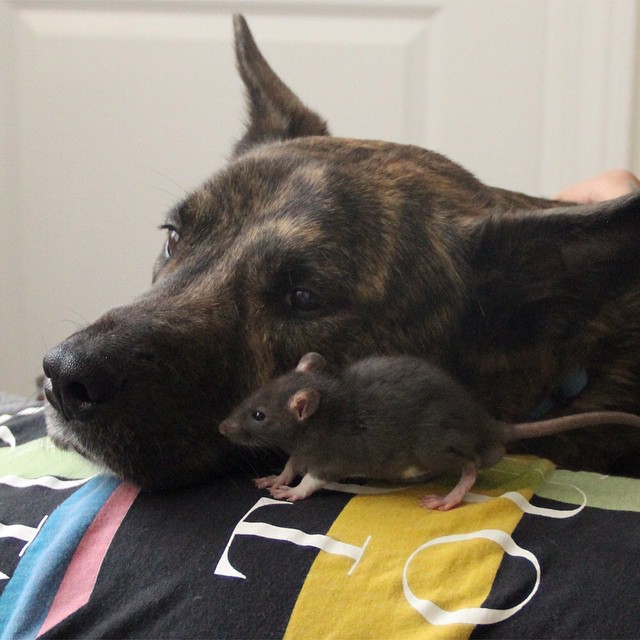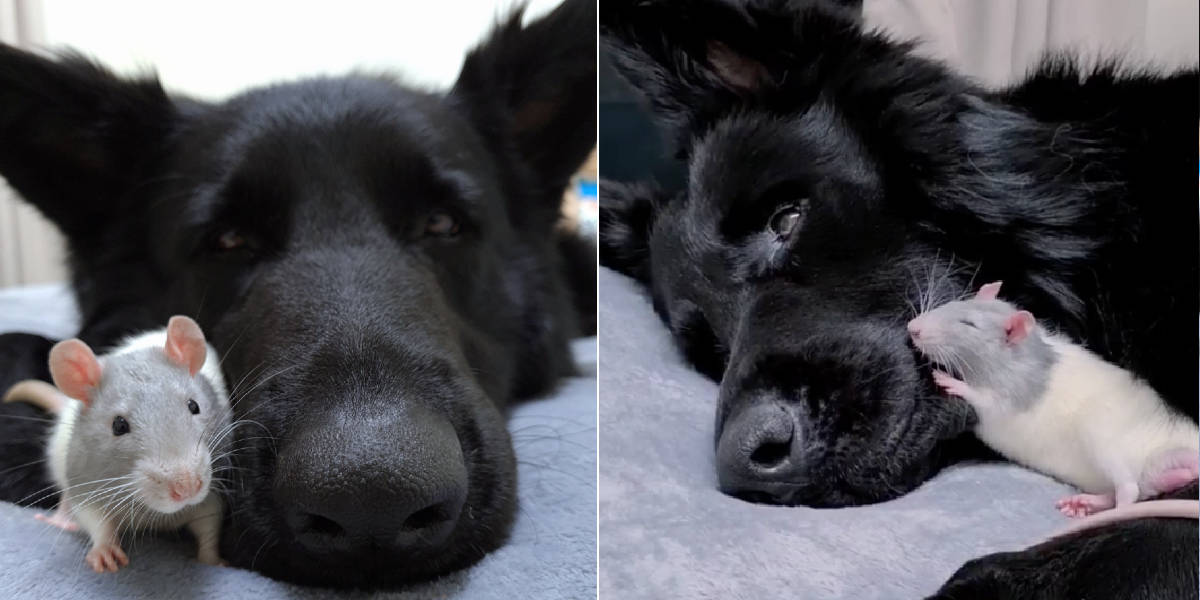Yes, rats are usually scared of dogs. It’s because rats have developed a natural fear of things that might harm them, and dogs are often seen as potential threats by rats. Rats are smart creatures, and this fear helps them stay safe from danger.
However, it’s essential to remember that not all rats react the same way around dogs. Some rats might be more afraid, while others might not be as frightened. It depends on their past experiences and the type of dog they encounter. Smaller, less aggressive dogs might not trigger as much fear in rats as larger, more active ones.
What Are the Characteristics of Rats?
Rats are highly adaptable rodents that have evolved to thrive in various environments around the world. They are known for their intelligence and ability to solve problems.
First and foremost, rats are considered highly intelligent animals. They are quick learners and can adapt to changing circumstances, making them successful in a wide range of habitats.
Then, rats are social creatures and often live in groups called colonies or packs. They engage in social interactions, such as grooming and playing, within their communities.
However, rats are primarily nocturnal, which means they are most active during the night. This behavior allows them to avoid predators and human activity.
Furthermore, rats are opportunistic feeders and have a diverse diet. They can consume a wide range of foods, including grains, fruits, vegetables, insects, and even small animals.
Rats are naturally cautious and tend to be wary of potential threats. They rely on their keen senses of smell, hearing, and touch to detect danger.
As well as rats are excellent diggers and often create intricate burrows and nests in which to live. These burrows provide protection from predators and serve as shelter.
Rats are prolific breeders, with the ability to reproduce rapidly. A single pair of rats can produce a large number of offspring in a short time, contributing to their population growth.
Also, rats are known for their grooming habits. They spend a significant amount of time grooming themselves to keep clean and remove scent markings.
Moreover, rats can be territorial and may defend their territory from other rats. They use scent markings to establish and communicate about their territory.
Finally, rats have a strong instinct for survival. They are resourceful animals that can adapt to various environmental conditions, making them successful in both urban and rural settings.
What Are the Fascinating Aspects of Dog Life?

Dogs, often referred to as “man’s best friend,” are remarkable creatures with diverse characteristics and behaviors that make them beloved companions worldwide. As one of the most popular domesticated animals, dogs have a rich and fascinating world worth exploring.
The Dog Family Tree
Dogs come in a wide array of breeds, each with its unique characteristics, sizes, shapes, and personalities. From the tiny Chihuahua to the majestic Great Dane, dogs have been selectively bred over centuries to fulfill various roles, from hunting and herding to providing companionship and support.
Dog Senses and Communication
Dogs possess exceptional senses, including acute hearing and an extraordinary sense of smell. These senses play a crucial role in their communication with both humans and other dogs. Their body language, vocalizations, and scent-marking behaviors can help us interpret their needs and emotions.
The Roles Dogs Play
Dogs wear many hats in our lives. They can be working dogs, assisting people with tasks such as search and rescue, herding livestock, or providing therapy and support to individuals with disabilities. Others are cherished family pets, offering companionship, protection, and unwavering loyalty.
The Bond Between Humans and Dogs
The bond between humans and dogs is unique and deeply rooted in history. Dogs have accompanied humans for thousands of years, evolving from wild canids to the beloved pets we know today. This relationship continues to evolve, with dogs playing an essential role in our emotional well-being and daily lives.
What are Rats Scared Of?
Rats are naturally cautious creatures and can be scared of various things. Here are some common things that rats are scared of.
Predators
Rats have evolved with a strong instinct to fear and avoid potential predators. This includes animals like cats, dogs, owls, and snakes, which are natural enemies of rats in the wild. The mere presence or scent of these predators can send rats into a state of heightened alertness and fear.
Loud Noises
Rats have highly sensitive hearing, which serves as a critical survival tool for detecting danger. Loud and sudden noises, such as clapping hands or a loud bang, can startle rats and trigger their fear response. They may quickly retreat to a safe location when exposed to such disturbances.
Bright Lights
Rats are primarily nocturnal creatures, meaning they are most active during the night. Bright lights can be unsettling for them, as they prefer dimly lit or dark environments. Exposure to bright lights can make rats feel exposed and vulnerable, causing them to seek shelter.
Unfamiliar Environments
Rats are creatures of habit and tend to thrive in familiar environments where they know the locations of food, shelter, and hiding spots. Sudden changes or being placed in an unfamiliar environment can make rats anxious and fearful as they navigate the unknown.
Human Activity
Rats are naturally wary of humans. Human activity, such as moving quickly or making sudden movements, can startle rats and cause them to retreat to safety. This wariness is an instinctual response to the potential threat posed by humans.
Unfamiliar Objects
Rats are naturally curious but can also be cautious about new objects introduced into their environment. They may approach unfamiliar objects with caution, often exhibiting hesitation and fear until they determine whether the object is safe or not.
Strong Scents
Rats have an exceptional sense of smell, which they use for navigation, communication, and identifying food sources. Strong or unfamiliar odors in their environment can be intimidating and cause rats to become cautious or avoid certain areas.
Can Dogs Sense Rats?
Yes, dogs have a keen sense of smell and can often sense the presence of rats. Dogs’ sense of smell is far more developed than that of humans, and they can detect scents at incredibly low concentrations. When it comes to rats, here’s how dogs’ sensing abilities come into play:
Scent Detection: Dogs have a strong olfactory system, with millions of scent receptors in their noses. They can pick up the scent of rats, including their urine, droppings, and the oils on their fur. This allows them to detect the presence of rats even if they are hiding.
Alert Behavior: When a dog detects the scent of rats, they often exhibit specific behaviors. These behaviors can include sniffing intensely, pawing at a specific area, or becoming agitated and barking. Dogs may also point or “freeze” when they sense rats.
Hunting Instinct: Many dog breeds have a natural hunting instinct, which makes them particularly skilled at tracking and catching rats. Breeds like Terriers, for example, were originally bred for hunting vermin, including rats. When they sense rats, their hunting instincts can kick in.
Deterrence: In some cases, dogs can serve as a deterrent to rats. The scent of a dog in an area can make rats wary and less likely to venture into that territory. This is one reason why some people use dogs as a means of rat control.
Rat Detection Training: Some dogs are trained specifically to detect the presence of rats. These dogs, often referred to as “ratting dogs” or “rat terriers,” are trained to find and indicate the location of rats. They are commonly used in pest control efforts.
It’s important to note that not all dogs will react the same way to rats. While many dogs have a natural inclination to chase or hunt rats, others may not show much interest. Additionally, a dog’s ability to sense rats may depend on factors such as their age, training, and breed.
How Different Dogs Affect Rats?
Different dogs can have varying effects on rats based on their breed, temperament, and training. Here’s how different dogs can affect rats
Hunting Breeds
Breeds specifically developed for hunting, such as Terriers and Dachshunds, have a strong prey drive and are often highly effective at catching and deterring rats. Their instincts and tenacity make them persistent rat hunters. They may chase, dig, and even kill rats, which can help control rat populations in certain environments.
Guard Dogs:
Guard dog breeds, like German Shepherds and Doberman Pinschers, are protective and may deter rats through their presence alone. Rats may be less likely to venture into areas where they sense the presence of a formidable guard dog. However, these breeds are not necessarily rat hunters and may not actively seek out rats.
Herding Breeds
Some herding breeds, such as Border Collies and Australian Shepherds, may instinctively try to control and herd rats rather than hunt them. While they may not eliminate rat populations, they can help keep rats in check and prevent them from spreading.
Non-Hunting Breeds
Breeds that were not originally bred for hunting or herding purposes may have little to no interest in rats. For example, toy breeds like Chihuahuas or companion breeds like Pugs are less likely to actively pursue rats. Their primary role is often as companions, and they may not exhibit strong rat-catching instincts.
Individual Temperament
Within any breed, individual dogs may have varying temperaments. Some dogs may be more interested in rats and display hunting behavior, while others may be indifferent or even afraid of rats.
Scaring Rats Away
The presence of any dog, regardless of breed, may serve as a deterrent to rats. Rats are generally cautious animals and may avoid areas where they detect the scent or presence of a dog.
Ratting Dogs
Some dogs are specifically trained as “ratting dogs” to locate and indicate the presence of rats without necessarily catching or harming them. These dogs can be valuable in identifying rat infestations in homes or businesses.
Does the Scent of Dogs Scare Rats Away?
Yes, the scent of dogs can often act as a deterrent and scare rats away. Rats have a highly developed sense of smell, and they are naturally cautious creatures.
When they detect the scent of a dog, they may interpret it as a potential threat, triggering a fear response. This fear can lead rats to avoid areas where they detect the presence of dogs, especially if they believe a dog is nearby or has marked its territory with its scent.
As a result, the scent of dogs can help deter rats from entering certain areas, making it a useful tool for rat prevention, particularly in homes or gardens where rats might be unwanted guests.
However, it’s worth noting that the effectiveness of this deterrent can vary depending on factors such as the rat’s familiarity with the scent of dogs, the dog’s size and breed, and the specific circumstances of the encounter.
Do Dogs Have a Natural Instinct to Hunt and Kill Rats?

Yes, many dogs have an instinctive prey drive that can lead them to chase and potentially kill rats. This behavior is rooted in their hunting ancestry, as dogs were originally domesticated for various purposes, including hunting small game and rodents. Certain dog breeds, such as terriers, were specifically bred for their ability to locate and capture pests like rats.
When a dog with a strong prey drive encounters a rat, their instinct may compel them to chase, catch, and, in some cases, harm or kill the rodent. However, not all dogs exhibit this behavior to the same degree, and some may simply chase or play with rats without causing harm.
The degree to which a dog displays this instinct can vary based on factors like their breed, individual temperament, and training. Proper training and socialization can help mitigate aggressive or harmful behaviors towards rats and other animals, ensuring safe interactions.
Additionally, responsible pet ownership involves taking measures to prevent dogs from hunting or harming wildlife in urban or natural environments.
FAQ
Are rats scared of dog smell?
Rats are often scared of the smell of dogs, as it can signal the presence of a potential predator. Their fear of dog scent is rooted in their natural survival instincts.
Will a rat fight a dog?
In most cases, rats will not engage in a fight with a dog. Instead, they will try to escape and avoid confrontation because dogs are typically much larger and more powerful.
Is it OK if my dog kills a rat?
While it’s natural for dogs to have a prey drive and chase small animals like rats, it’s essential to discourage them from killing rats due to the potential for disease transmission and other risks. It’s safer to intervene and prevent such encounters.
Can rats give dogs rabies?
It is extremely rare for rats to transmit rabies to dogs. Rats are not a common reservoir for rabies, and the risk of transmission is minimal.
Do dogs eat rats?
Some dogs may try to eat rats, especially if they catch them. However, this behavior should be discouraged, as it can pose health risks to the dog.
Do rats carry rabies?
While it is theoretically possible for rats to carry rabies, it is exceptionally rare. Rats are not considered a significant source of rabies transmission to humans or other animals.
Can a rat hurt you?
Yes, a rat can potentially hurt you if it feels threatened or cornered. Rats have sharp teeth and can bite if they perceive a threat.
Can rats bite you in your sleep?
It is unlikely that a rat would bite a person in their sleep unless it felt cornered or threatened. Rats are more likely to avoid humans.
What happens if a rat scratches you?
If a rat scratches you, it’s essential to clean the wound thoroughly and watch for signs of infection. While rat scratches are generally not serious, they should be treated with care to prevent infection.
Can rats climb walls?
Yes, rats are excellent climbers and can scale walls and other vertical surfaces. Their climbing ability allows them to access various locations.
Can rats give dogs diseases?
Rats can carry diseases that may be transmitted to dogs. It’s essential to keep dogs away from rats and to ensure their vaccinations are up to date to minimize disease risk.
Final words
Rats are often scared of dogs, primarily because of their natural instinct to perceive dogs as potential predators. This fear is deeply ingrained in their survival mechanisms, as rats are cautious creatures that rely on their keen senses to detect and escape from danger.
However, it’s essential to remember that individual rat reactions can vary based on factors such as their past experiences and the specific dog’s size and temperament. While this fear helps rats stay safe in the wild, it also underscores the importance of responsible pet ownership and humane pest control methods when dealing with rat-related issues.



